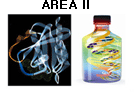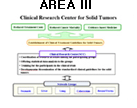Introduction
One of the National Cancer Center(NCC)'s most important functions
is to conduct its own research and support the Korean cancer community's
research activities. As a cancer research hub of Korea, the NCC Research
Institute is striving to develop, through its intra- and extra-mural programs,
innovative technologies to prevent, diagnose, treat and predict cancer.
In doing so, research activities are centered around the six most common
cancers in Korea - stomach, liver, lung, colorectum, breast, cervix uteri.
In addition, the institute collects and analyses information on the latest global
trends in cancer research and disseminates data to the cancer community in Korea.
The institute, armed with a vision of culminating into a center of excellence that explores new frontiers in cancer
research through innovative ideas and novel technologies, established its new long-term goals in 2003 as follows;
Research Area
| Research Topics |
|---|
|
Intramural Research
- Convergence Cancer Research for Public Core - Cancer Research on Envision of Precision Medicine - Cancer Control Research in Care Continuum and Evidence-based - Open-Public Cancer Research Infrastructure |
| Extramural Research - Convergence and Translational Cancer Research - Research on Cancer Prevention, Control, Services - Public and Multi-Institutional Cancer Clinical Trials - Support for Regional Cancer Centers - Research on Cancer Control Planning and Policy - Virtual Oncology Drug Development Venture - Miscellaneous |
Policy Directions for R&D Program: Emphasis on Translational Research
Staffed by high-caliber researchers and the most up-to-date equipment
and facilities such as the seven-story research building with a total floor space of
33,000m² and the experimental animal facility, the institute is trying to meet the
aforementioned vision of becoming a leading cancer research center by adopting the
following strategies:
- Development of innovative prevention, detection and treatment technologies for cancer in the post-genome era
- Focusing on translational research, in which the results of basic research are turned into new interventions that can be applied to cancer patients and people at risk.
Precision Medicine

We are also leading Precisine Medicine Research to contribute health data to improve health outcomes, fuel the development of new treatments, and catalyze a new era of data-based and more precise medical treatment.
B&D for Cancer Therapeutics
The NCC, in cooperation with the government, is trying to introduce a new national drug development initiative to
bridge the gap between discovering drug candidates for cancer and translating them into therapeutics. Dubbed as
the 'Bridging and Development Program for Cancer Therapeutics', this new initiative is to facilitate the drug
development process by having a special board of experts in and out of the NCC carry out pre- and early phase
(I, II)- clinical trials for the new candidates they have solicited from the originating inventors and evaluate the results
as well instead of the inventors. The NCC aims to develop at least three cancer drug candidates that will enter the
phase-III clinical trials by 2019.
Research Areas
The institute's research projects consist of both NCC's Institutional R&D Program and contract-based R&D projects
from the industry. Its research activities are categorized into the following three areas:

- Building national Infrastructure for cancer research
- Provision of the resources, infrastructure, and technologies for biospecimen-based
translational cancer research: Operation of a tumor bank and a genomics core lab.
in cancer

- Developing of innovative prevention, detection, and treatment technologies by multidisciplinary approaches
- Molecular mechanisms of carcinogenesis : Cell differentiation, tumorigenesis, and metastasis
- Molecular profiling of cancer cells : Molecular target identification, development of anti-cancer drug candidates and elucidation of their mechanisms at the molecular level
- Molecular/cellular theropeutics for cancer : Development of gene theropies with particular emphasis on cancer oriented delivery systems, immunotherapy using dendritic cells, and production of therapeutic andibodies.

- Enhancing the infrastructire for clinical cancer research with the outcome of improved patient care
- Support for multi-institutional clinical trials in cancer that will lead to the development of standard treatment protocols for common cancers in Korea
- Conduct clinical trials of a new generation of therapeutic anti-cancer agents meeting international standards







